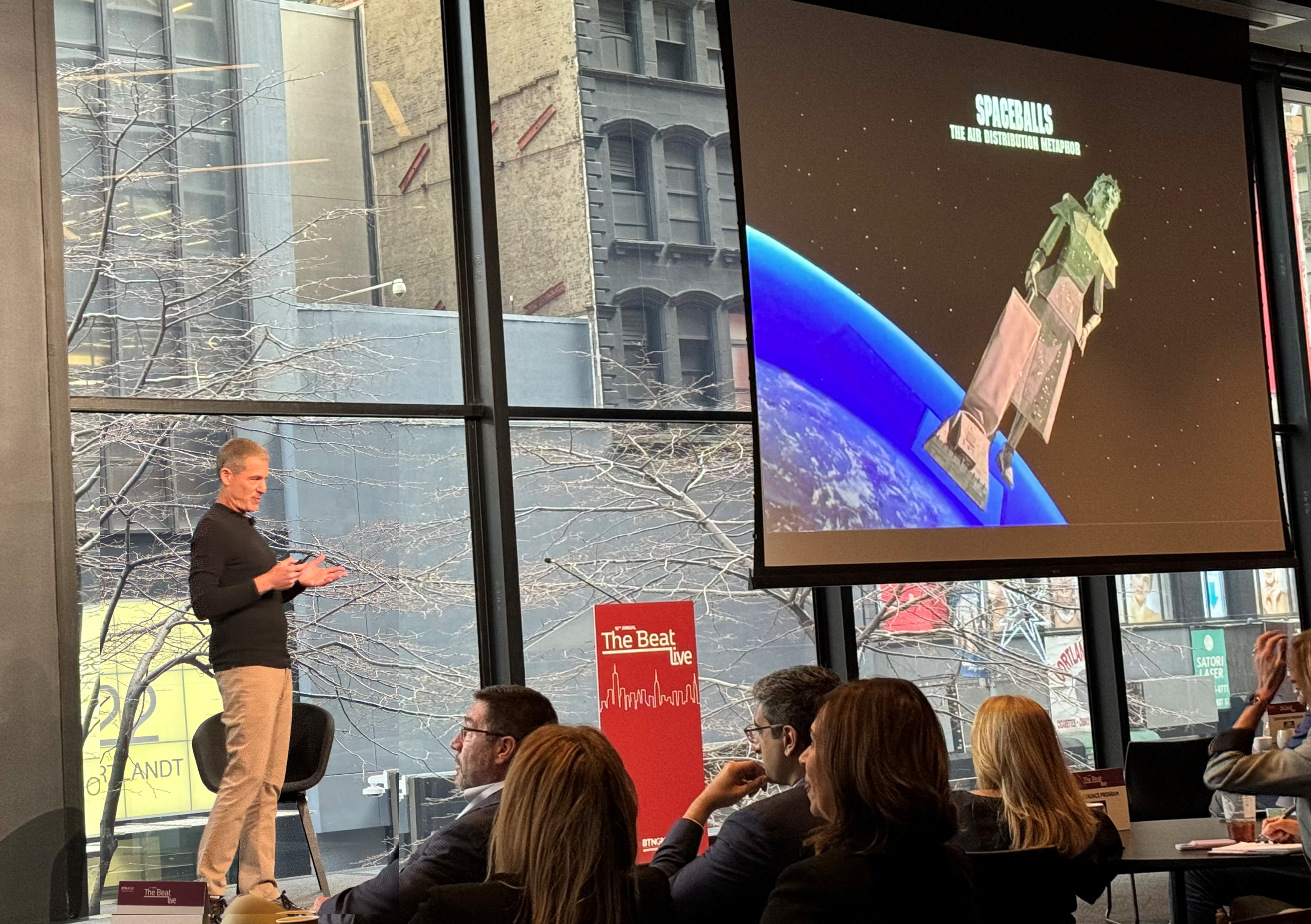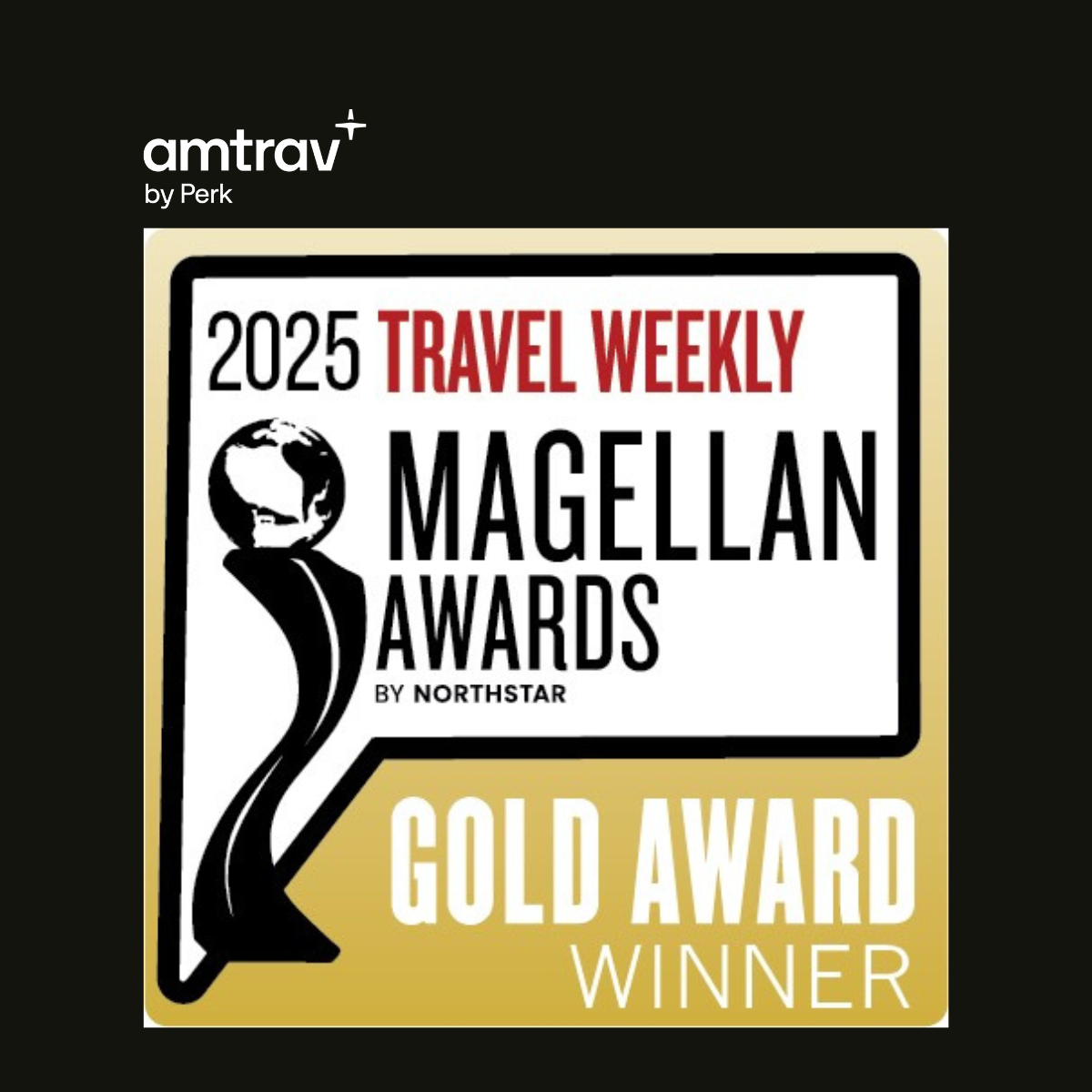Last December, our CEO Jeff Klee delivered the keynote speech at The Beat Live Conference in New York City, which brings together senior executives from the corporate travel distribution and technology world. In his speech, which he called "The End of the Beginning," Jeff uses anecdotes from the '80s cult classic Spaceballs, the game show Jeopardy and the holy day Yom Kippur to frame the evolving upheaval in the ways business travel is booked and sold. Spoiler alert: despite the chaos, he's optimistic that the ultimate winners will be companies and travelers.
Keynote audio & slides:
Transcript:
Thank you Susan and thank you Jay for having me. I love this event, this is my favorite event of the year. I swear I'm not just saying that because I'm here.
And thank you all for voting for me. I really admire a lot of the people who submitted entries. I feel a little bit unworthy. But I am flattered. And I will do my best to not let you down.
My liver thanks you too, I would’ve drank way more last night if I didn't have to give this speech today. But let's get into it.
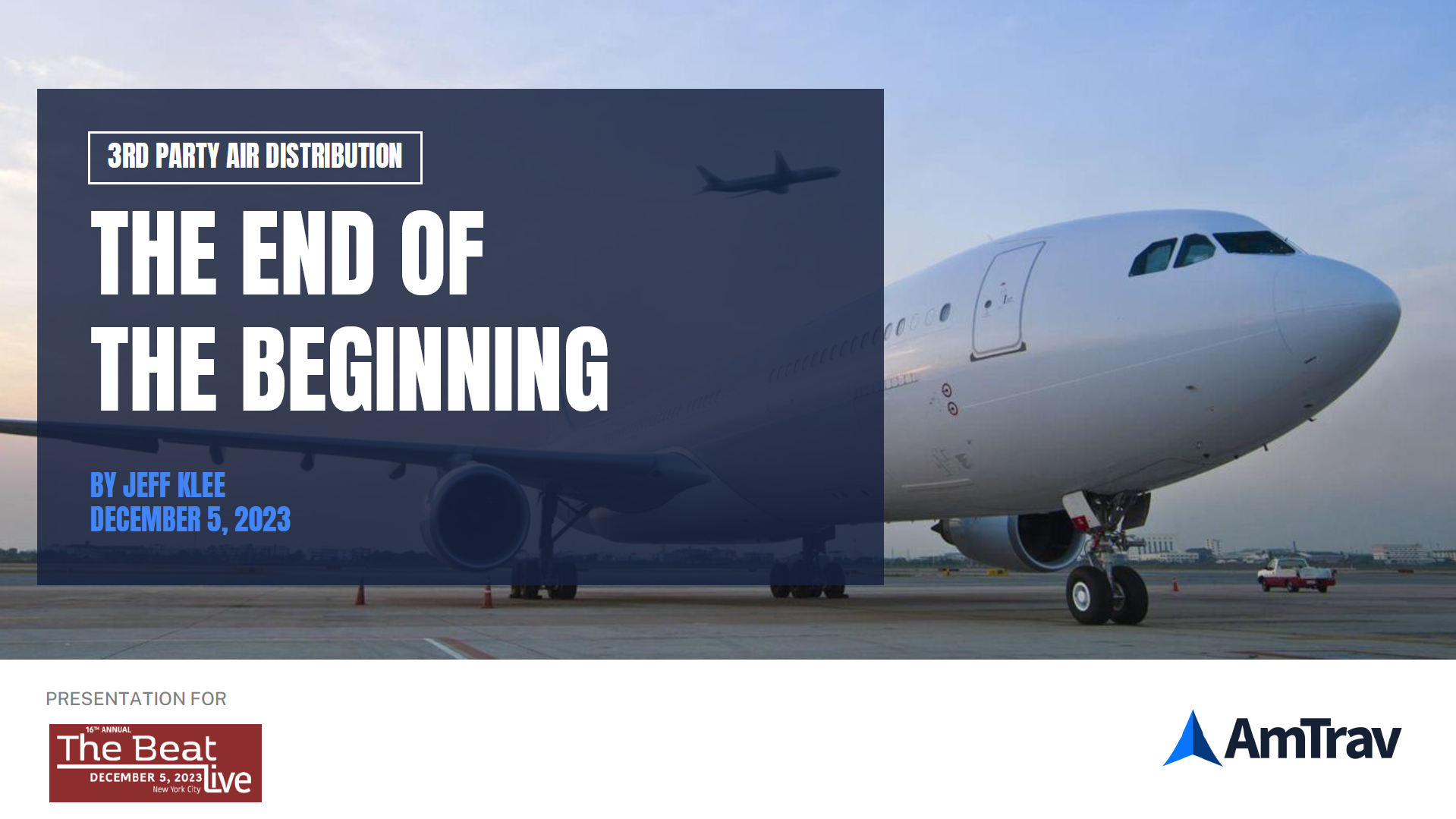
My speech is called “The End of the Beginning.” And I am going to try to convince you that whenever, many years from now, someone writes a book on the history of airline distribution – which will be a real page turner – everything that any of us have ever known, no matter how old we are -- even if you're old like me -- our entire careers will be condensed into one chapter that covers a very long period of time where not much actually changed, at least fundamentally.
And that's going to be followed by Chapter Two, which is going to cover the next two years, where everything changes, the whole industry is turned upside down.
And then I don't know what Chapter Three is going to look like but we will contemplate some of the possibilities.
(Note: only a selection of the slides shown at the event are included.)
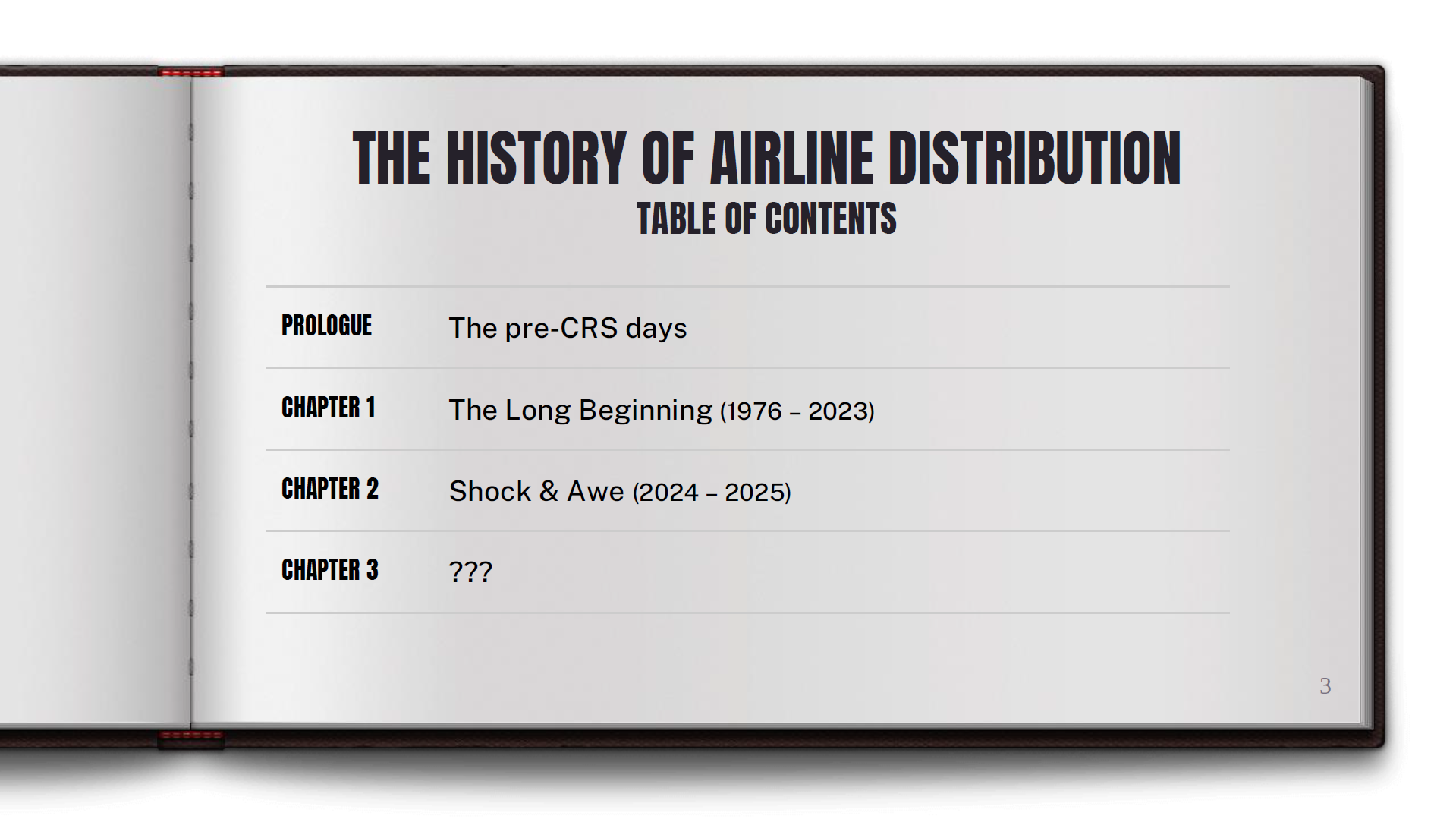
Let's start at the beginning.
I've been doing this since 1989 and during that time things have changed for travelers: they've got online booking tools now, they've got e-tickets, but under the hood, fundamentally, we've digitized a lot of manual processes but we haven't really tackled the plumbing.
Our processes have barely changed: when someone makes a booking on a "modern" online booking tool, that booking is likely getting queued somewhere and it's going through a bunch of scripts. There's a fare basis code on the ticket and then something gets put in the endorsement box and it goes to the mid-office then it goes to the back office, and at some point this comes into play:
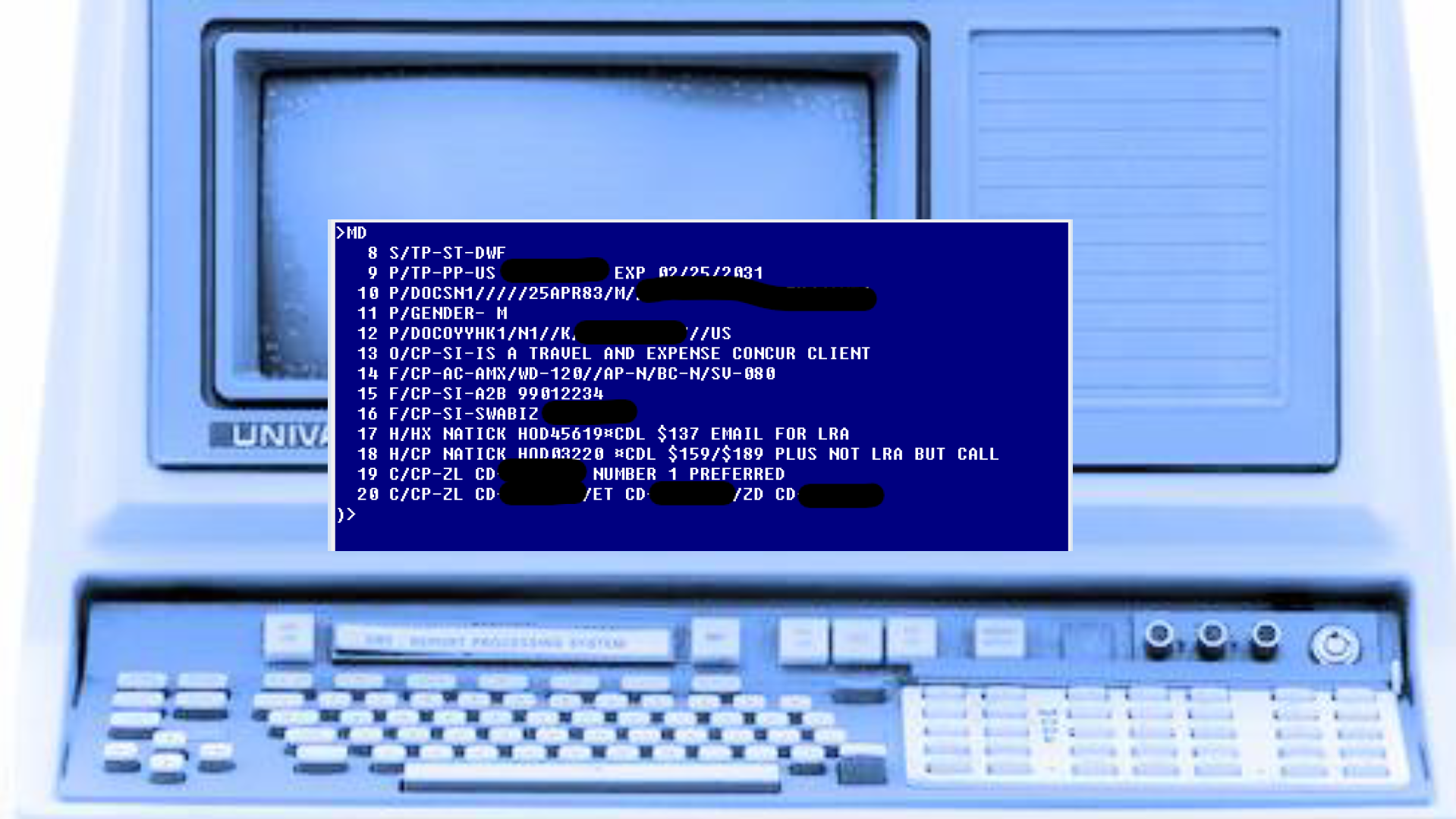
This monstrosity.
The GDS PNR.
50, 75, 100 lines of all caps, Courier New unstructured text.
This is still the primary vehicle by which we pass data from system to system in our industry.
The commercial models have not really changed (either): then and now we TMCs we get commissions from airlines, the GDS is getting money from airlines, and some of that gets kicked back to us. And we charge fees. And even though there's been some shift in that, still, today, over 50% of the revenue from most TMCs is triggered by the booking of an airline ticket!
And the airline infrastructure: you airlines have built these great modern eCommerce platforms. to power your direct sites. But third party distribution remains in a silo. Completely shut off. A parallel universe that’s bloated and complicated.
Is this benefiting the airlines?
I would argue that in 1989 the costs of distribution were probably pretty balanced with benefits because airlines needed a network of travel agencies to literally distribute their tickets.
But what about now?
Has anyone seen the movie Spaceballs?
I know I'm dating myself and I'm probably lowering myself here but this was a really funny movie from the ‘80s. For those of you who haven't seen it, the basic plot was that there was this evil planet Spaceballs that didn't take care of their environment and they were running out of fresh air. So they came up with a plan to fly this spaceship shaped like a giant maid with a vacuum cleaner -- they called it Mega Maid -- and it was going to fly to Planet Druidia which has tons of fresh air, and it was going to literally suck the air out of Druidia and transfer it to Planet Spaceballs.
You got that?
In the climactic scene the hero tries to thwart the plan by shifting Mega Maid into reverse. Let's watch:
Now for some weird reason that makes me think of airlines and TMCs. (Because) if we're honest, we TMCs have been doing a lot more sucking than blowing for a very long time.
If you think about things that TMCs want from airlines, airlines have pretty much been bending over backwards to deliver these things historically, maybe until this year.
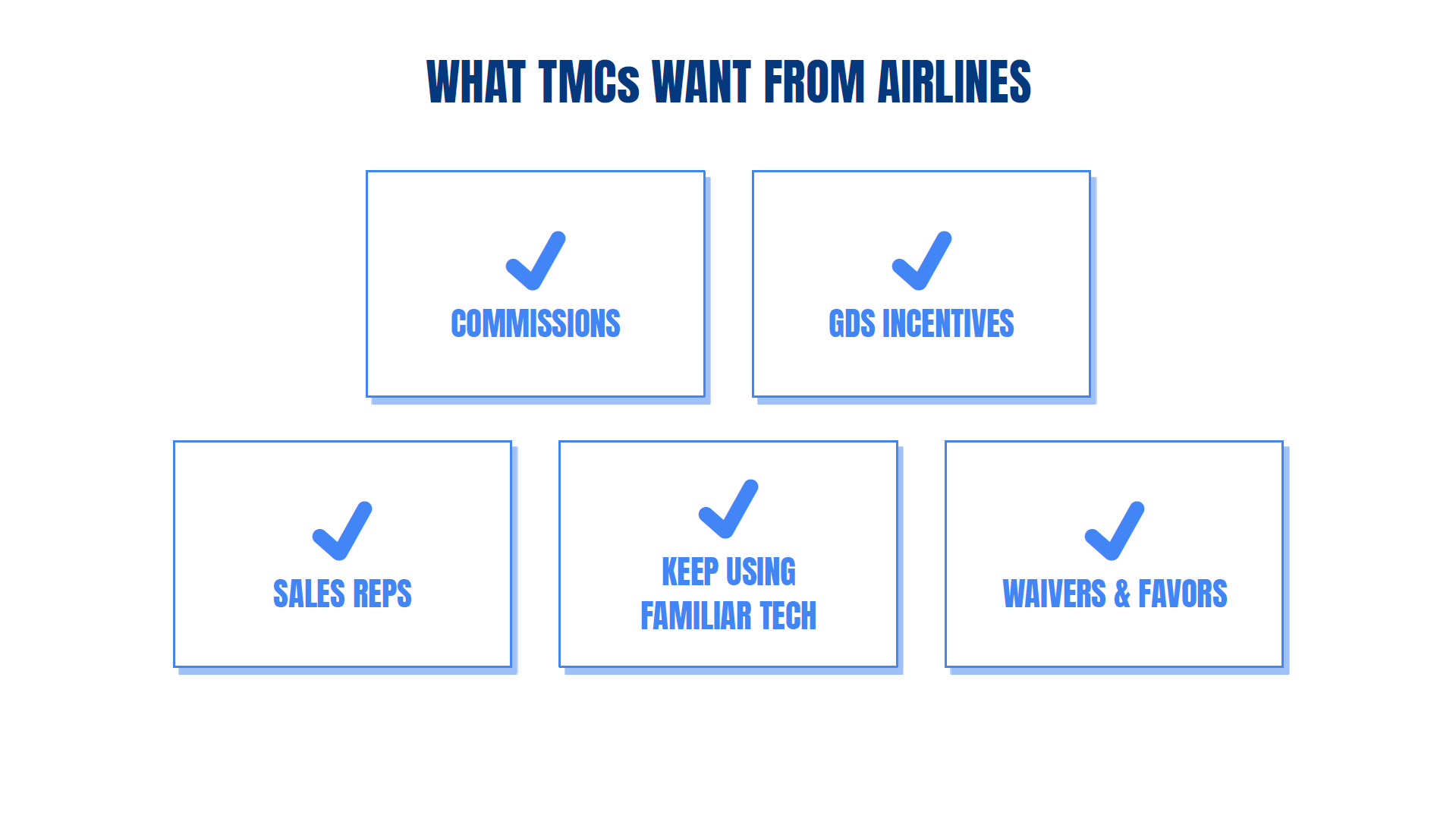
But what about the things that airlines want from TMCs?
How many TMC owners or executives are lying awake at night thinking: “How can I help my airline partner grow their loyalty program?” Or: “How can I force my OBT to show more products?”
I've been in lots of TMC group meetings where I've heard things like: “If airlines aren't going to pay me extra commission to sell premium seats, then let them sell their own damn seats.”
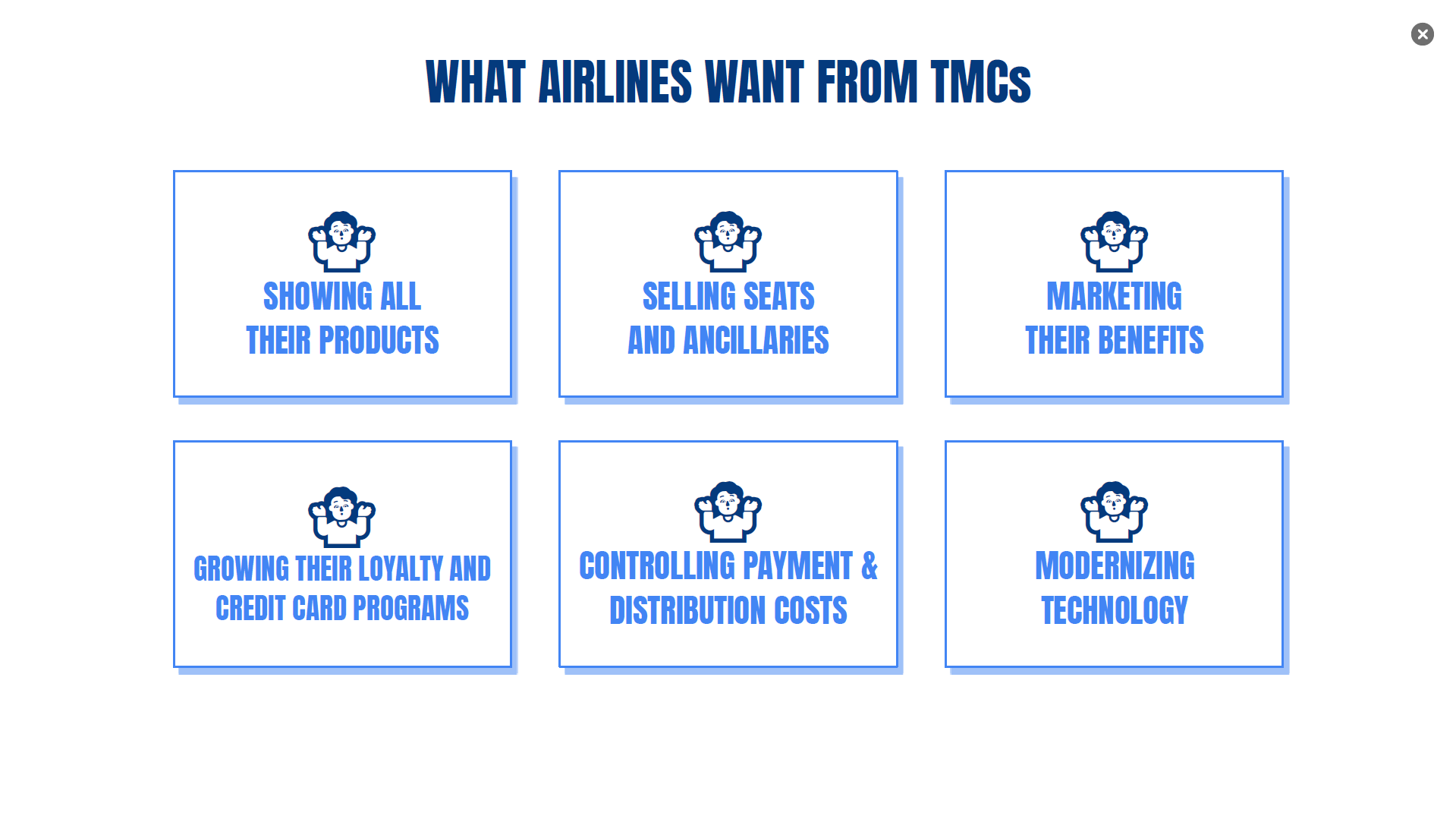
There is a sense of entitlement among TMCs and I think it comes from the fact that we think we deliver to airlines the travelers that spend the most money, so therefore we're really important. But we don't really deliver those travelers, the companies do.
Show of hands from the buyers in the room: how many of you would stop traveling for business if TMCs were to vanish tomorrow?
(Pause for audience response)
None of you.
Now I don't think that would be a good thing, but you’d get by.
Graveyards are full of indispensable men. And companies. Let's not forget that.
The most impactful day in the history of AmTrav was January 7, 2011. At that time we were a consumer brand, we weren't even into corporate travel.
That morning I got a call from Chris Phillips, I don't know if any of you know Chris, he is the VP of global sales for ATPCO, but at the time he was the Managing Director of Distribution for Delta Air Lines. Chris said to me: “I have to ask that you stop selling Delta on CheapAir.com.” He said: “We've done the analysis and the tickets that you're selling, we could sell those same tickets for cheaper and we would attach more ancillaries."
"You're just not adding any value to us.”
That hit me like a ton of bricks. My whole career I've been maniacally focused on adding value, but for the customers. I quite frankly (had) never thought about the other side of the supply chain.
That was a turning point for us. From that day forward we committed to building features that we think airlines (will) find valuable. We soon thereafter pivoted to corporate and every time I see Chris now, I thank him because he gave me a wake up call 13 years ago that many of my competitors are just getting now.
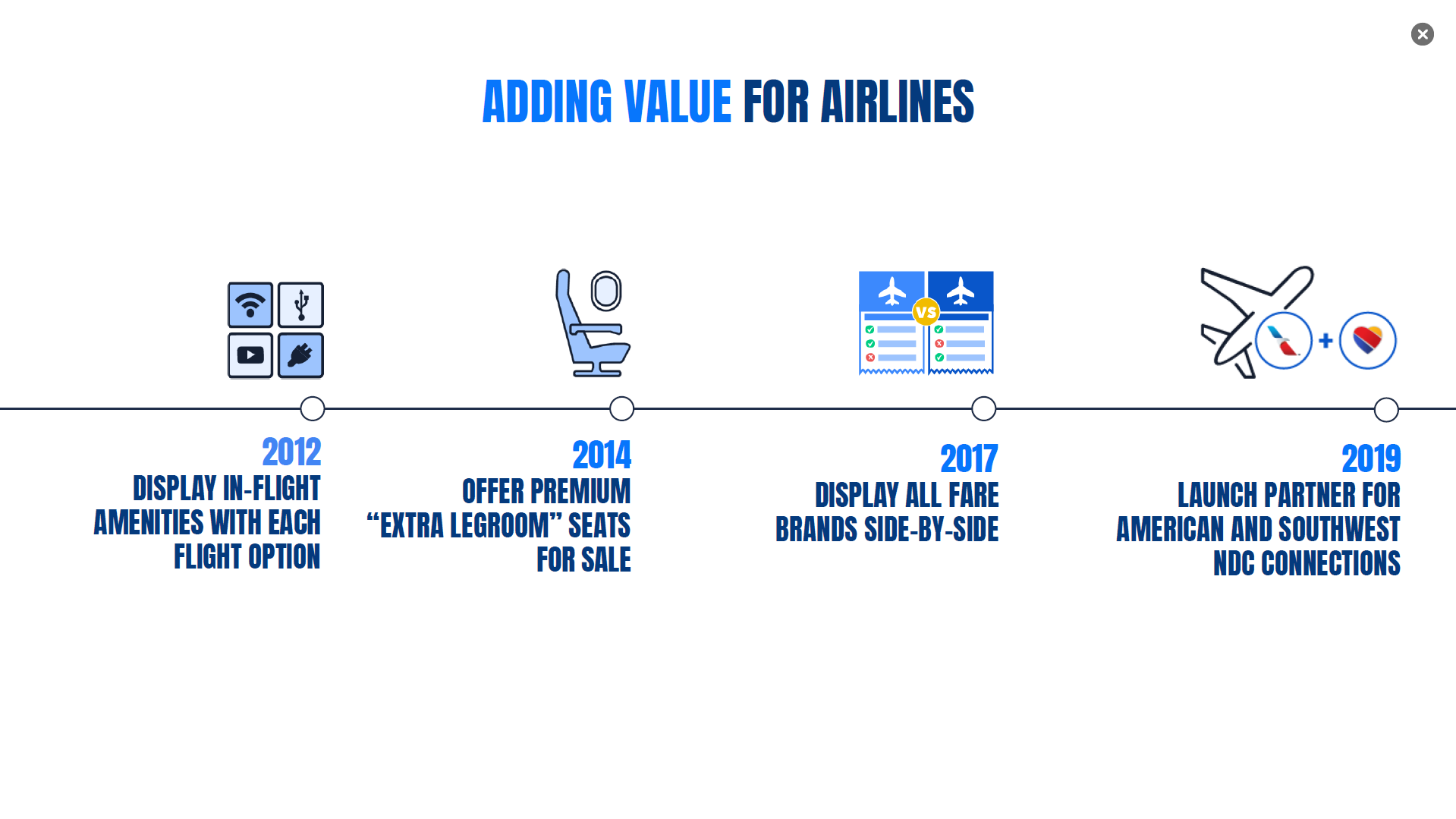
Let's play Jeopardy.
You guys know how Jeopardy works, right? You pick a category and dollar amount and then you get an answer and you've got to match it to the right question.

So I am going to pick “Things Airlines Don't Love about TMCs" for $200.
“Not having all their products on the shelf or controlling their offers.”
I think that is “What are reasons indirect channels drive less revenue?”
(ding. ding)
All right, got it right!
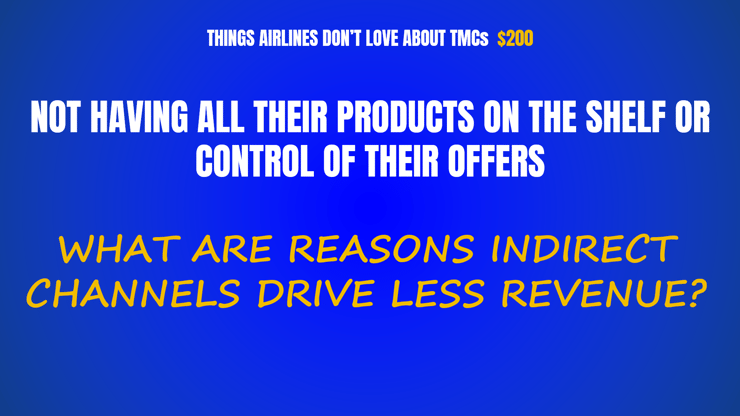
I'm gonna go with “Things Airlines Don't Love about TMCs" for $400 dollars.
“A top goal for many airlines which they believe is hard to advance in indirect channels.”
What is loyalty?
(ding, ding)
I’m on a roll!
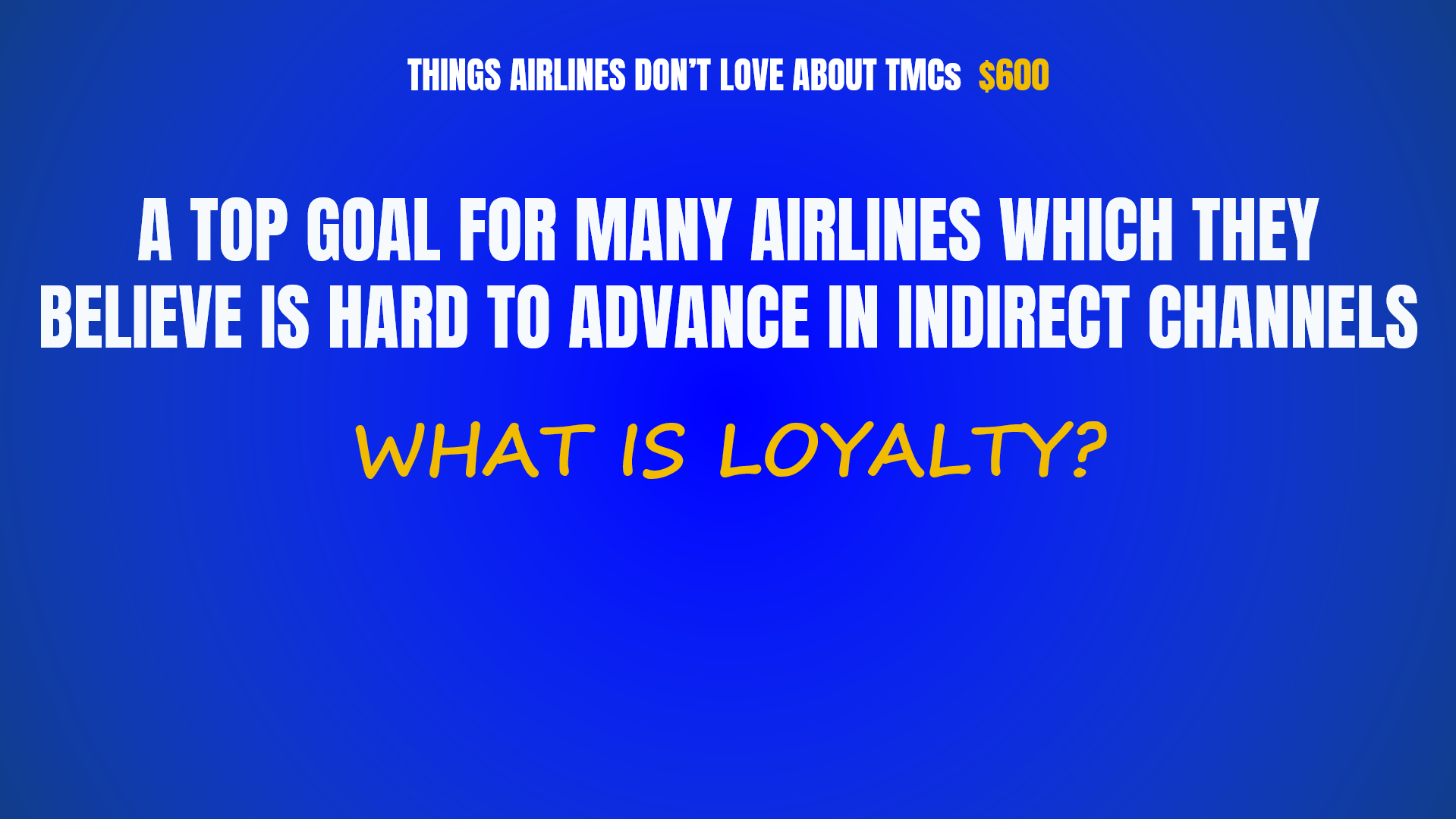
“Things Airlines Don't Love about TMCs" for $600.
“A common excuse given by TMCs for why we can’t modernize our tech stack.”
I know this one! It’s “What is it will break my duty of care?”
(ding, ding)
Just to be clear: I'm not dismissing the importance of duty of care, but I am seriously questioning the notion that in 2023 there's absolutely no other way to facilitate duty of care than having the booking come in in an EDIFACT PNR.
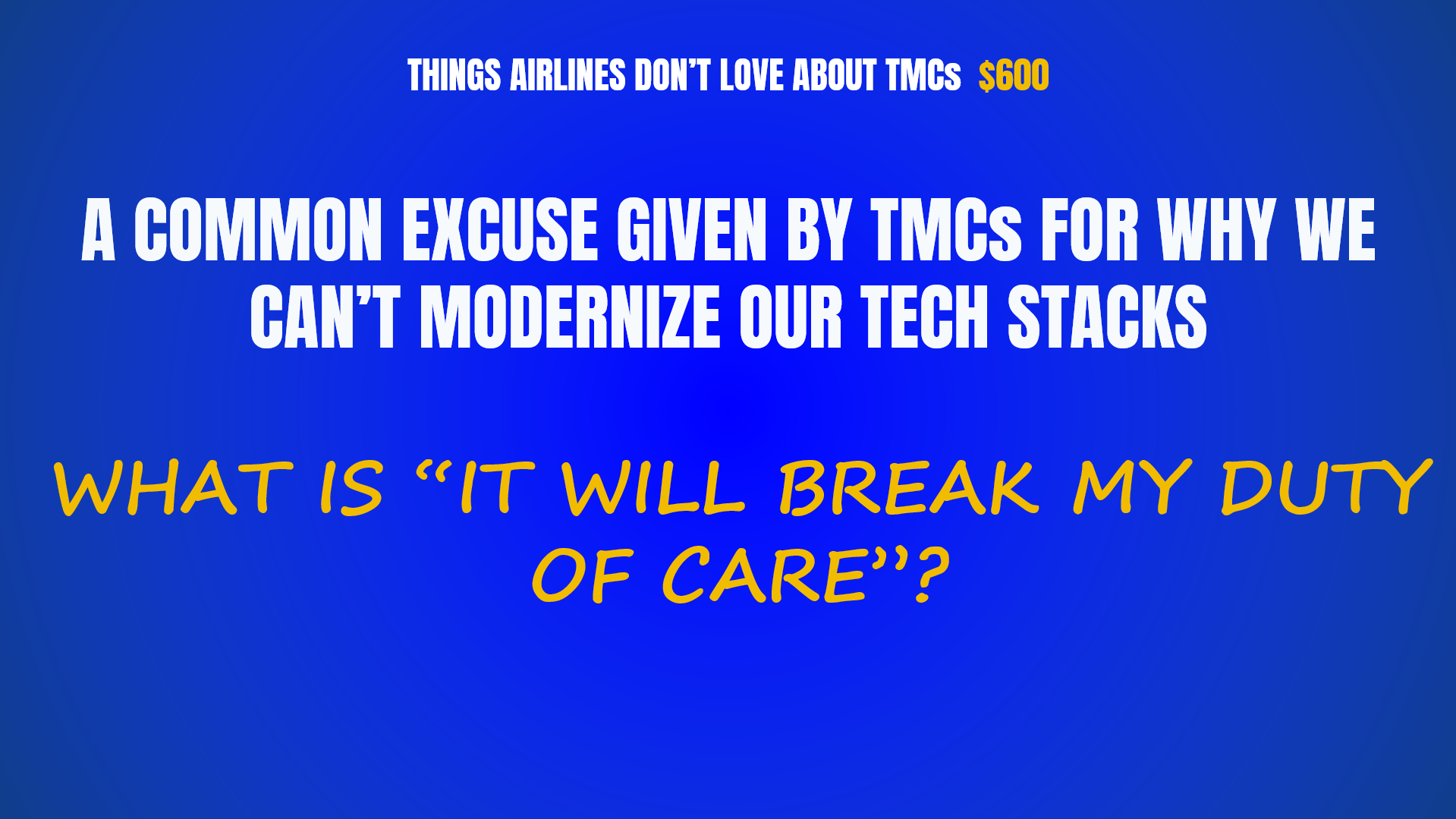
I'm gonna go big now. I'm gonna go “Things Airlines Don't Love about TMCs" for $1,000.!
“A large expense that misaligns incentives and drives airlines crazy.”
“What are GDS incentives?”
(ding, ding)
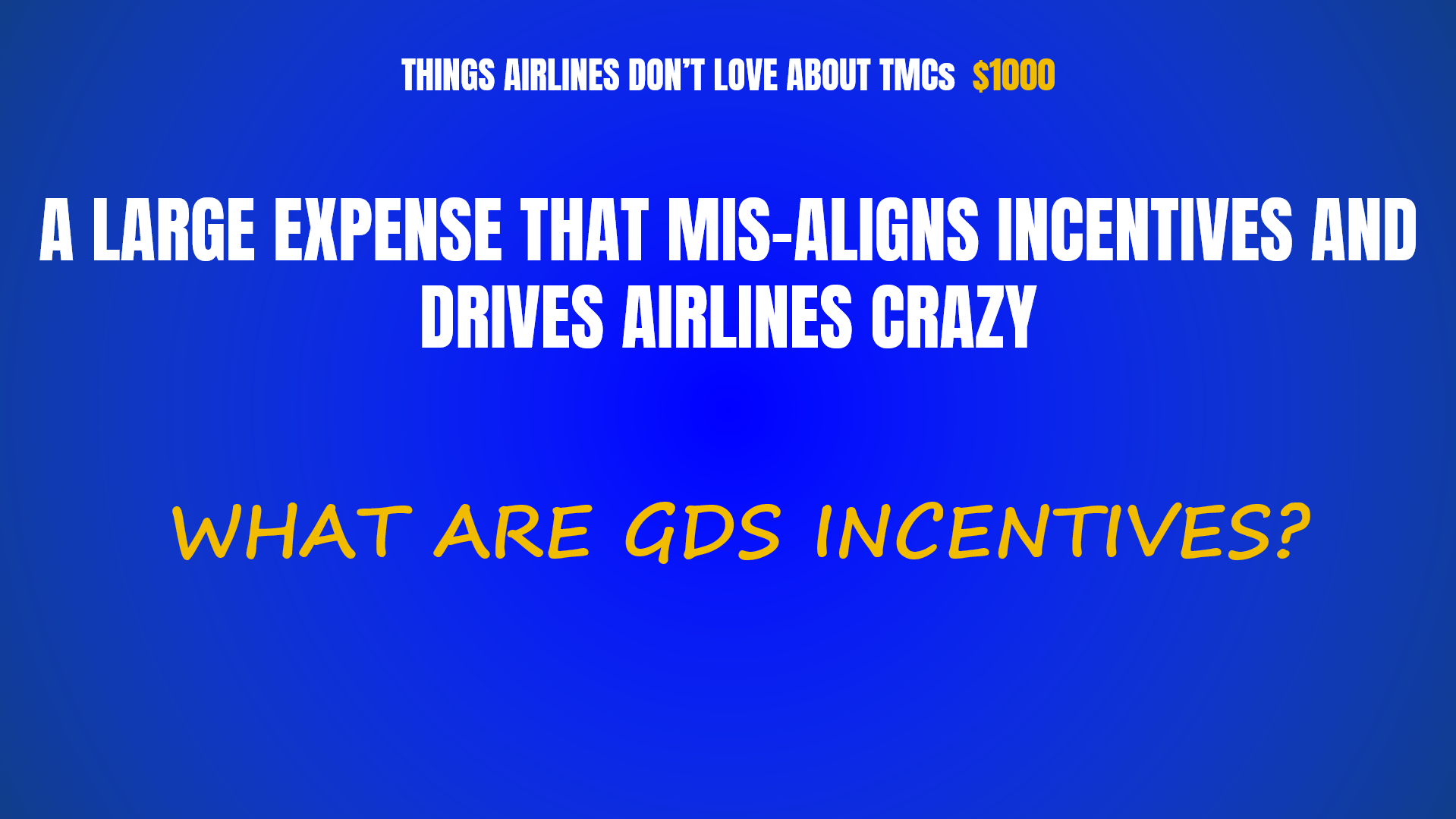
You get the point!
Those are the reasons why airlines don't love TMCs. But what are the reasons why airlines do love and need and value TMCs?
One thing that we hear all the time is “To shoulder the servicing burden.” There are lots of corporate tickets issued, corporate travelers need to change a lot, and airlines couldn't possibly handle the burden of dealing with all those changes (themselves).
Except:
Glenn at United presented this slide recently. United is already servicing tons of TMC bookings and what's more, United doesn't care because it's all automated now.
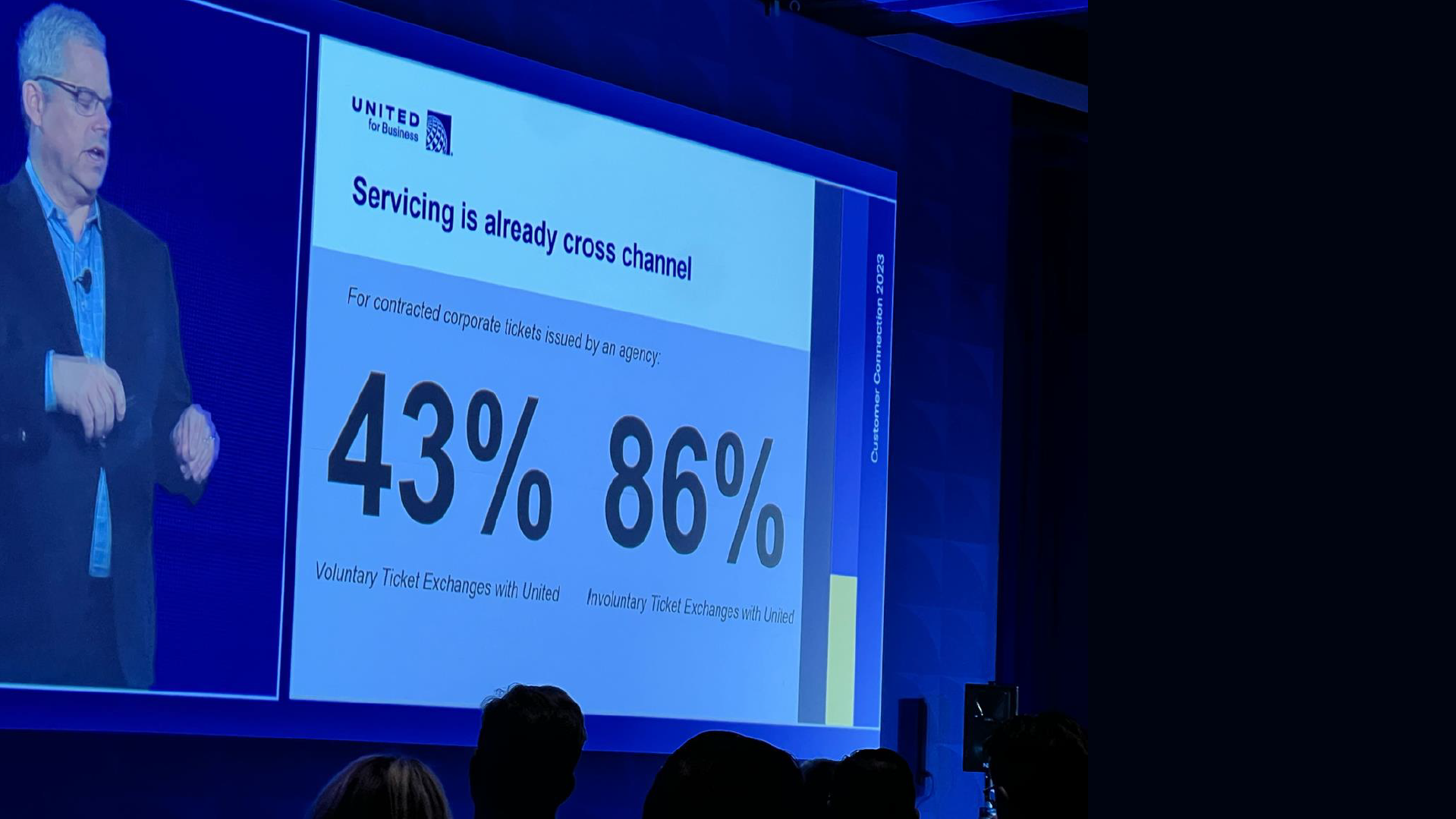
What about “business travelers prefer to book with TMCs”?
This is also a myth. In fact, if there's one thing you get out of this speech, I hope it is this:
We TMCs provide a lot of value at the company level with savings, visibility and control, and companies appreciate it. But we have a growing problem where travelers, especially younger travelers, don't like to book in our channels. They like the supplier direct experience, they don't like the content gaps (on corporate booking tools) and they don't like the fact that it's harder to change (your trips).
No matter what else happens, if we can't fix this problem, then we are irrelevant going forward and there's nothing we can do about that.
Another reason we hear a lot for why TMCs are needed is because there are no viable alternatives. The only way companies can manage their travel is with a TMC.
But these guys would all say otherwise...
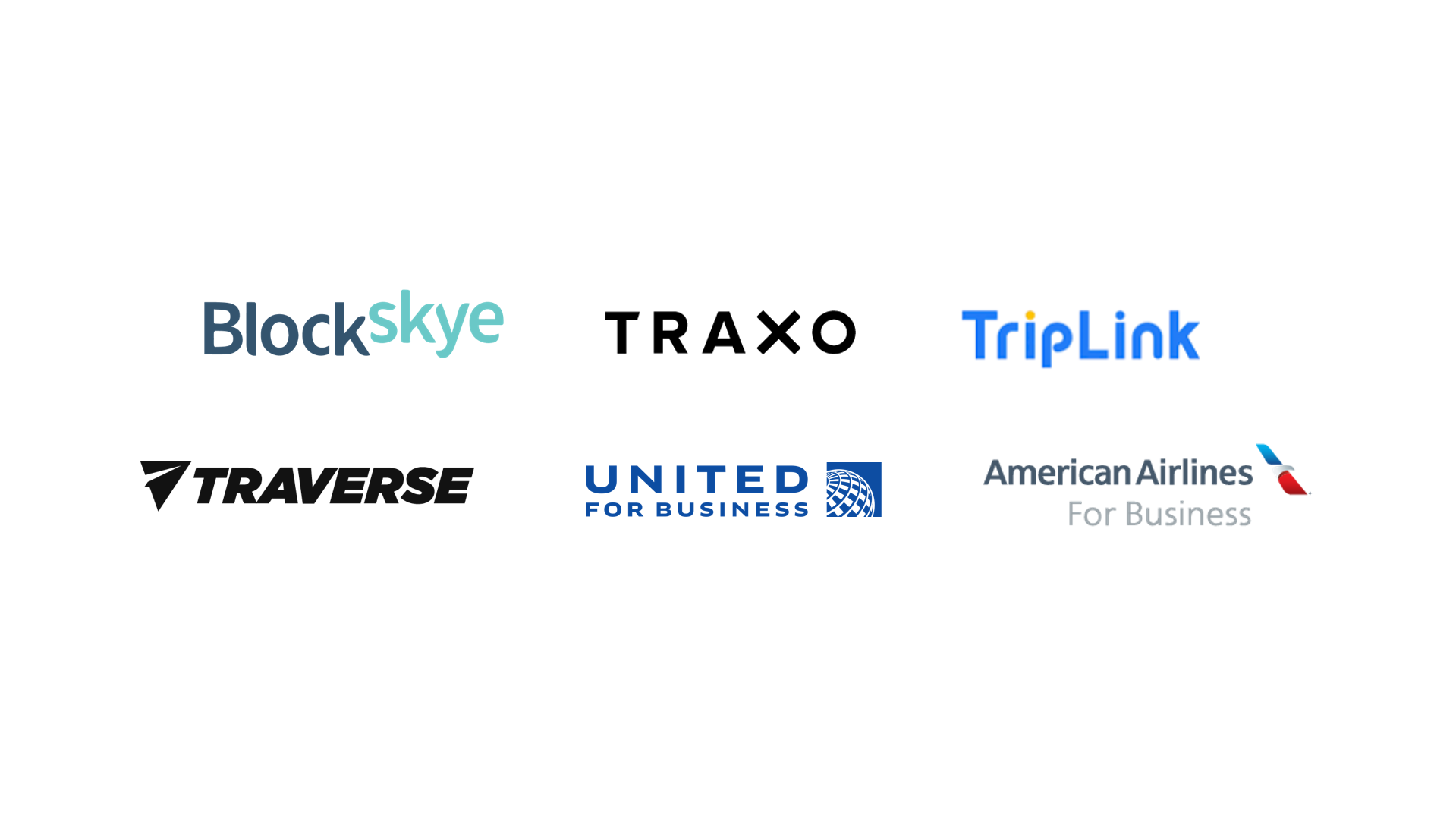
Blockskye. Paul mentioned they're doing $1 million to $2 million a day in business just from the PWC account. And they've come up with this great way to eliminate credit card fees for the airlines – you talk about adding value for airlines, that's adding value!
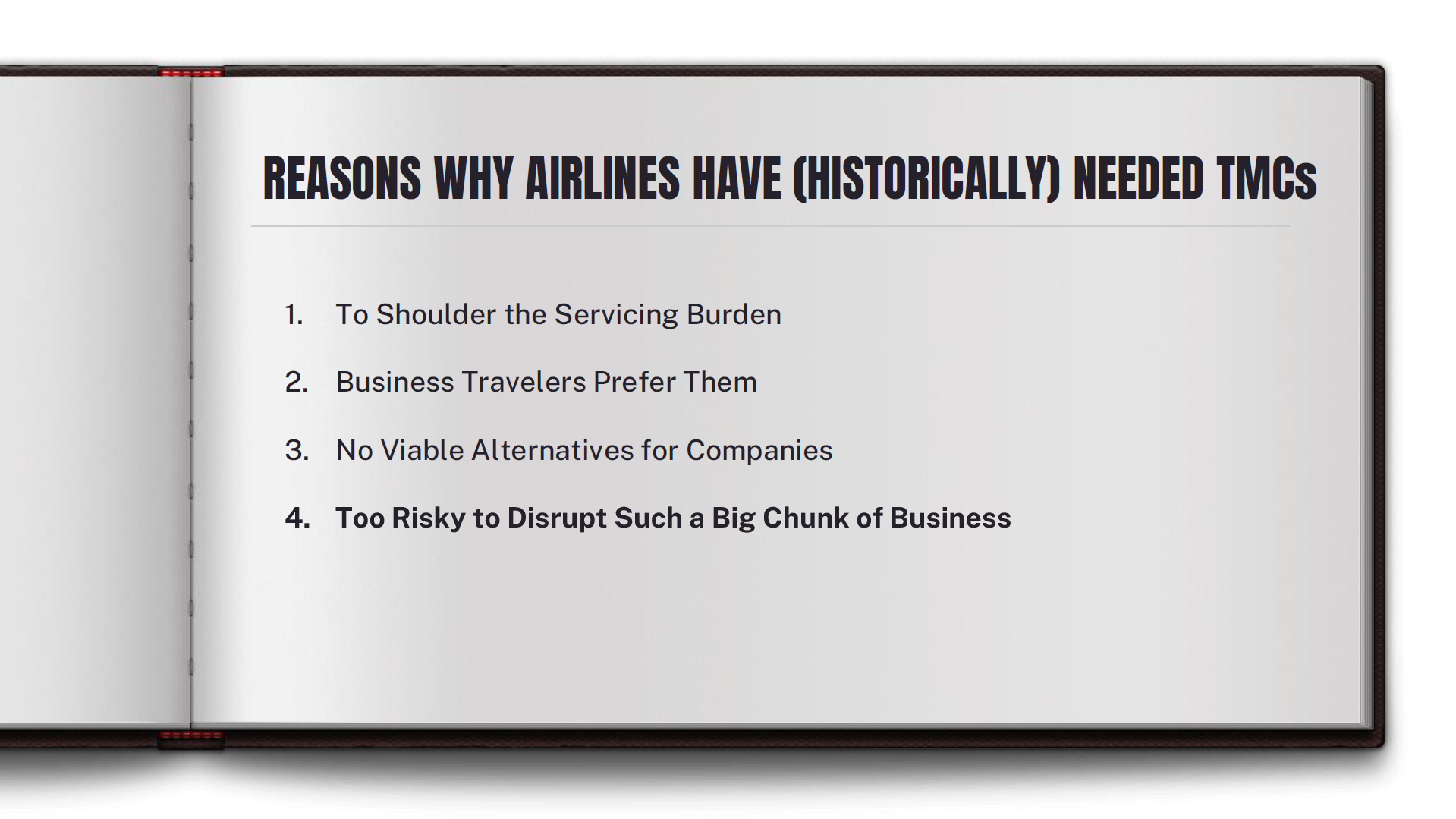
And then finally we hear that business travel is so important so “We can't touch it, we can't disrupt it.”
But we've all seen the headlines: business travel from an airline point of view, especially managed business travel, just isn't as important, isn't as big a slice of the revenue pie as it used to be.
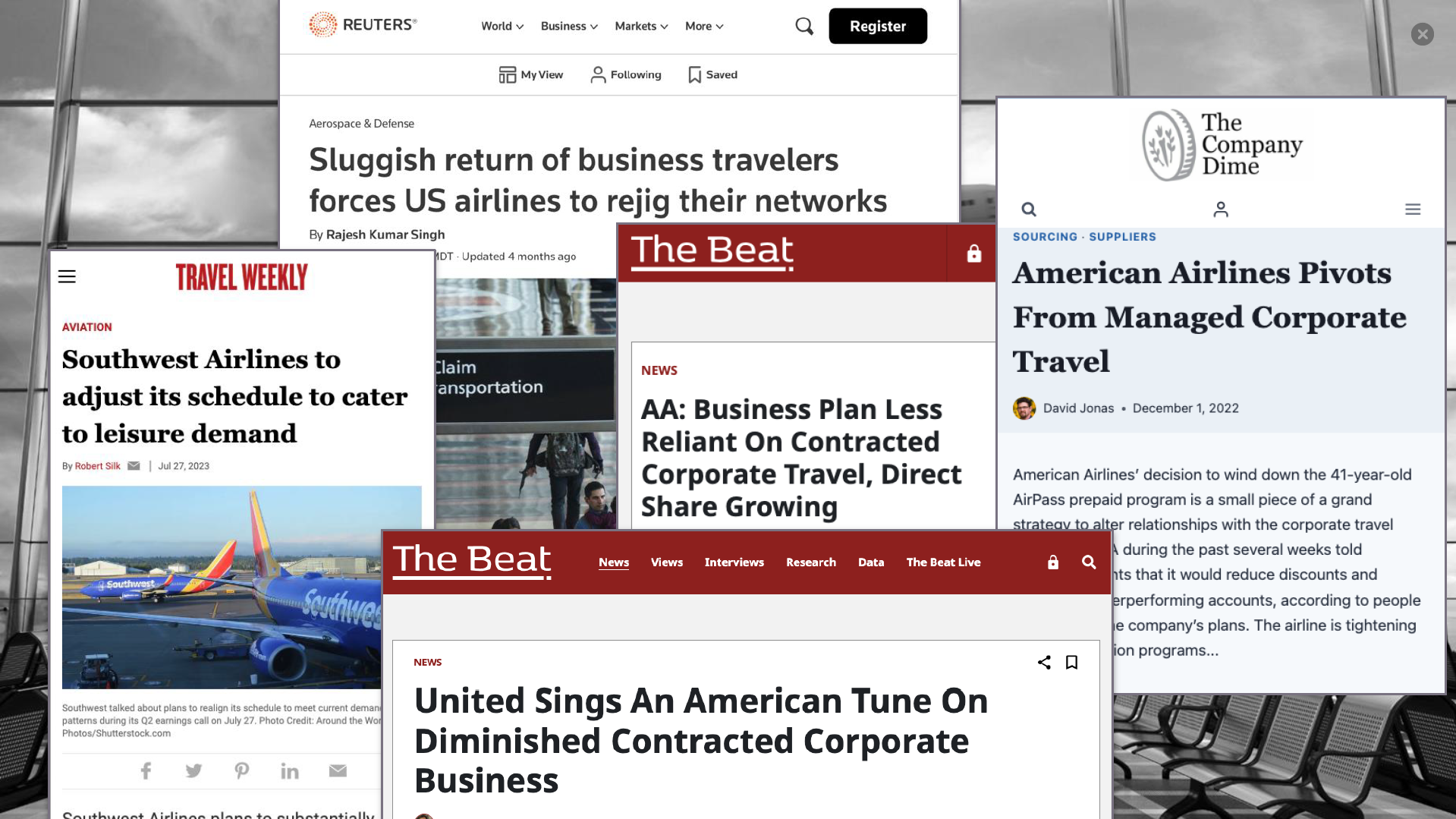
This leaves us in a really dangerous situation. You've got airlines increasingly frustrated with TMCs who aren't willing to modernize, TMCs who are digging their heels in and stalling and not embracing modernization. And airlines feeling that they have a lot less to lose by rocking the boat.
So what we're seeing is airlines everywhere signaling in stronger and stronger ways that they're willing to blow the whole thing up.
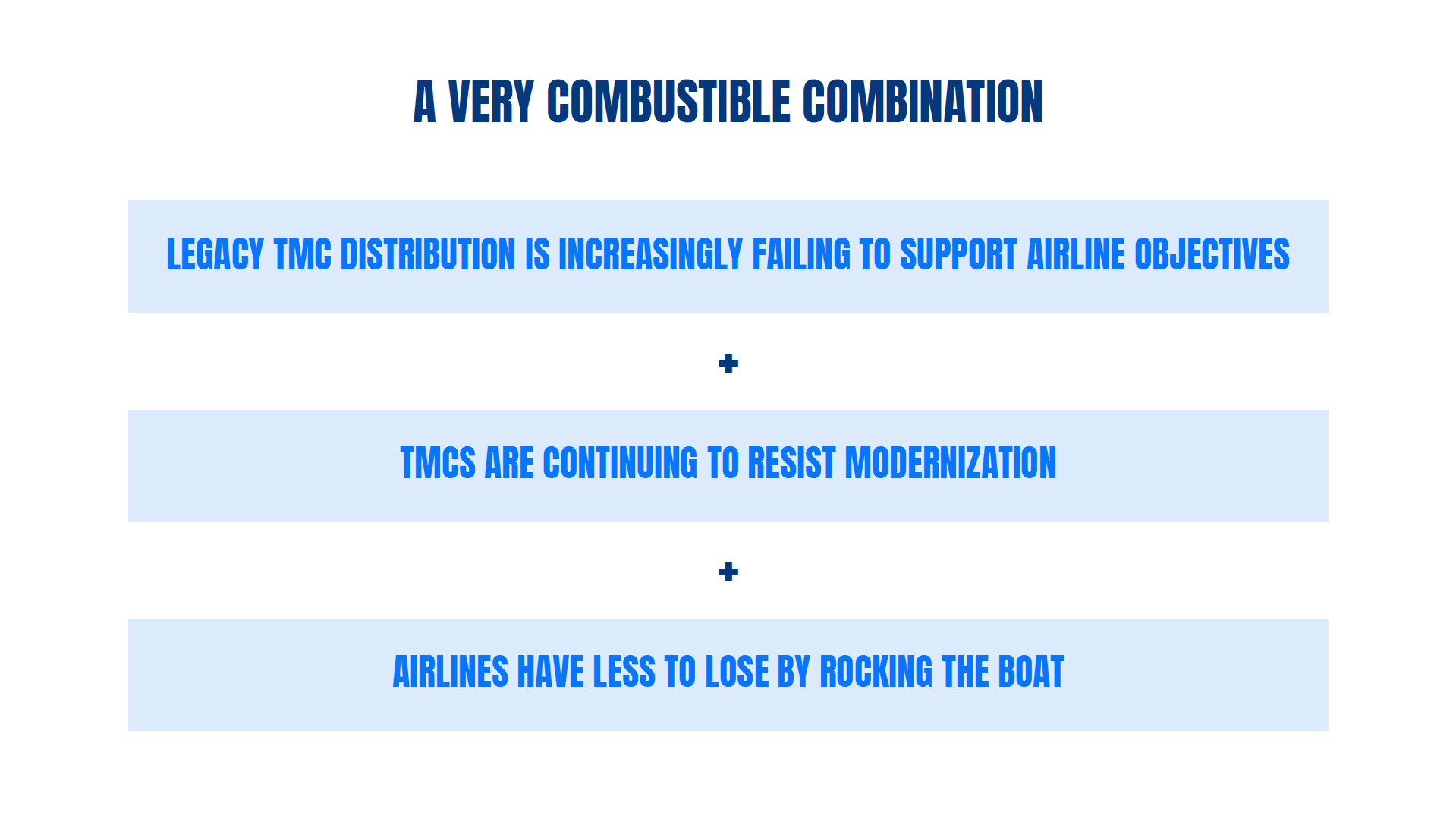
But Delta’s going to save us, right?
I hear that all the time. And I think every TMC in this room and most corporate buyers really, really appreciate Delta's unwavering commitment to the managed travel space.
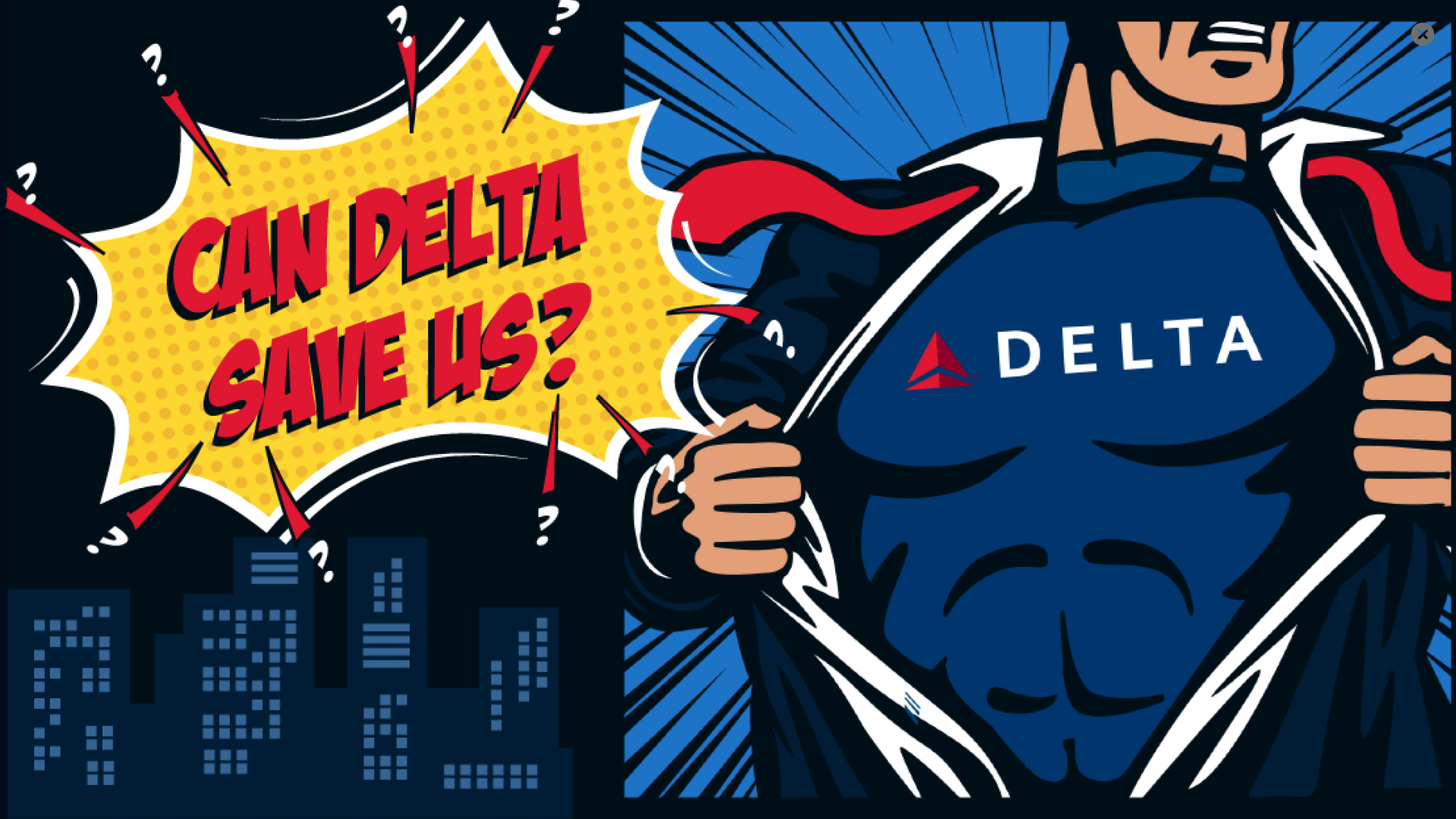
But the people at Delta are really smart. And Cory alluded to this last year on this stage: if their competitors, through modernization of their distribution, are going to be able to save money, and they're going to be able to generate more revenue with continuous pricing and dynamic pricing, Delta is not going to stand pat. They are too smart for that.
No airline can veto what is happening. They will be at a competitive disadvantage and that won't work for them.
Who said this?
“At the current trajectory 95% of intermediaries in the airline space will be disintermediated within the next five years.”
Anyone know?
It’s a trick question.
I said it.
Just now at the Beat Live.
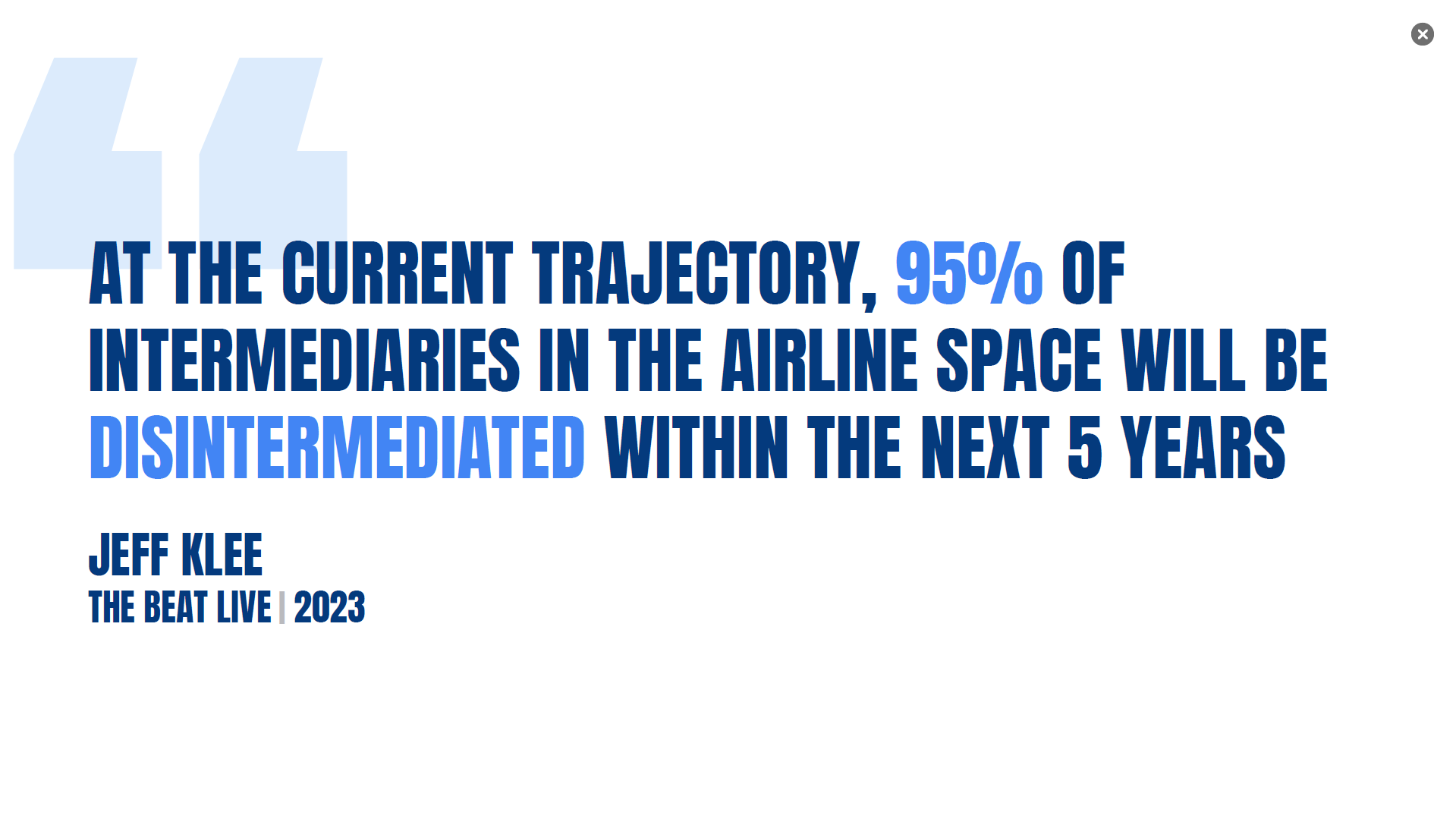
This is happening!
Airlines are collectively reaching the decision that “We are done with the status quo,” and the plans they are making are not ten years out, they’re two year plans.
But wait!
I'm Jewish and we have a day, Yom Kippur, which is the holiest day of the year. We're taught that that's the day that God finalizes who's earned the right to be in the Book of Life so that they will live next year.
We go to temple and we hear things like “On Rosh Hashana it is written and on Yom Kippur it is sealed,” talking about the Book of Life being finalized. It's a little depressing for someone who believes in free will and ‘it ain't over until till it's over.’
But then there's this point where the Rabbi says: “Wait!”
It's at the very last minute.
And then he goes on to say, basically, “Everything I've been saying for the last three hours is complete bullshit” – I'm paraphrasing – “It's not too late! If you act right now, the Book of Life can be unsealed!”
That's where we are right now.
We're standing on the cliff, but we've got a small window where we can fix things.
What does that look like?
For TMCs it means letting go.
TMCs have done an unbelievable job harnessing every ounce of capability off of really old technology. But what got us here won't get us to where we need to go. We really need to almost start over with our tech stacks, with really open minds, and really blank slates.
And we need to flip the commercial model. For as long as I've been in business there's been this butting of heads between airlines and GDSs. Airlines don't like that GDSs charge them a lot of money and that some of that gets rebated back to the TMCs. It's just not sustainable to have a distribution system with that much friction in it going on forever.
And, finally, I think TMCs need to rethink what it means to be a partner. Airlines always say that in their direct channels, that's where they can promote loyalty. I reject that premise. I'm loyal to a lot of brands that I like to buy on Amazon because I like buying lots of things at once. There's no reason TMCs can’t help airlines enroll frequent flier members, get credit card applications, get app downloads. We just need to be willing to do it, and to think of ourselves differently in the role that we play.
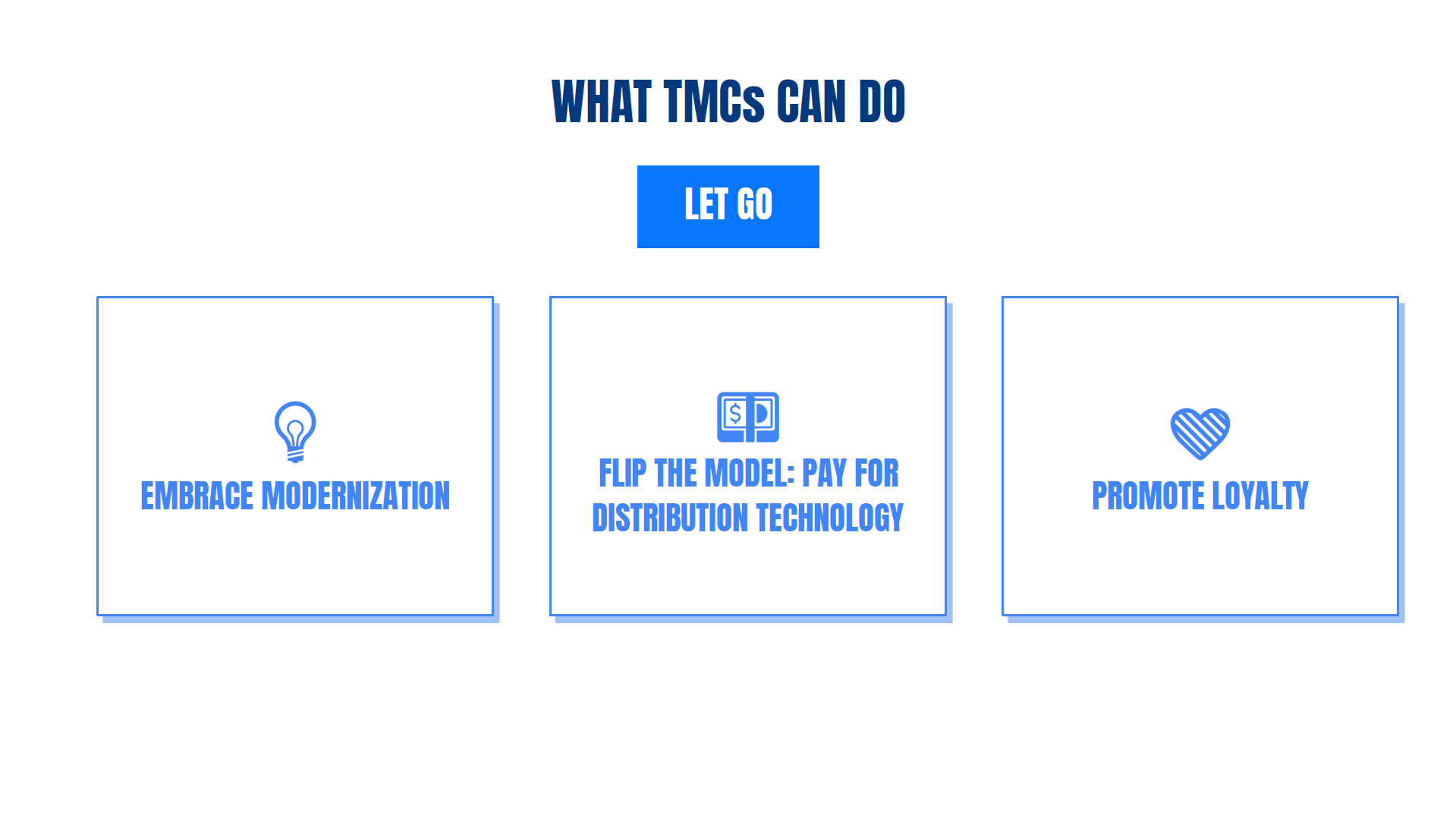
Buyers. Buyers in the room: you have loud voices, use them.
Don't settle. If your OBT makes it so your travelers must go to the airline website to pick a seat after booking in an OBT, or you can't change your ticket on your OBT, that's not okay. Figure out who's responsible. Is it the airline gap, or a TMC gap, or a booking tool gap? And then raise hell! Vote with your feet if you have to.
And I would also urge buyers this: we complain that there's not enough innovation in our space, and I think that is true. Part of the problem is we've got these really great young entrepreneurs and good startups, but it's so hard to crack the corporate travel world. So if you're a buyer and you see a startup that has a product that addresses a pain point of yours, throw them a bone. Give them a shot. Do a pilot, I think that would help get these startups more traction. It would be good for the whole industry.
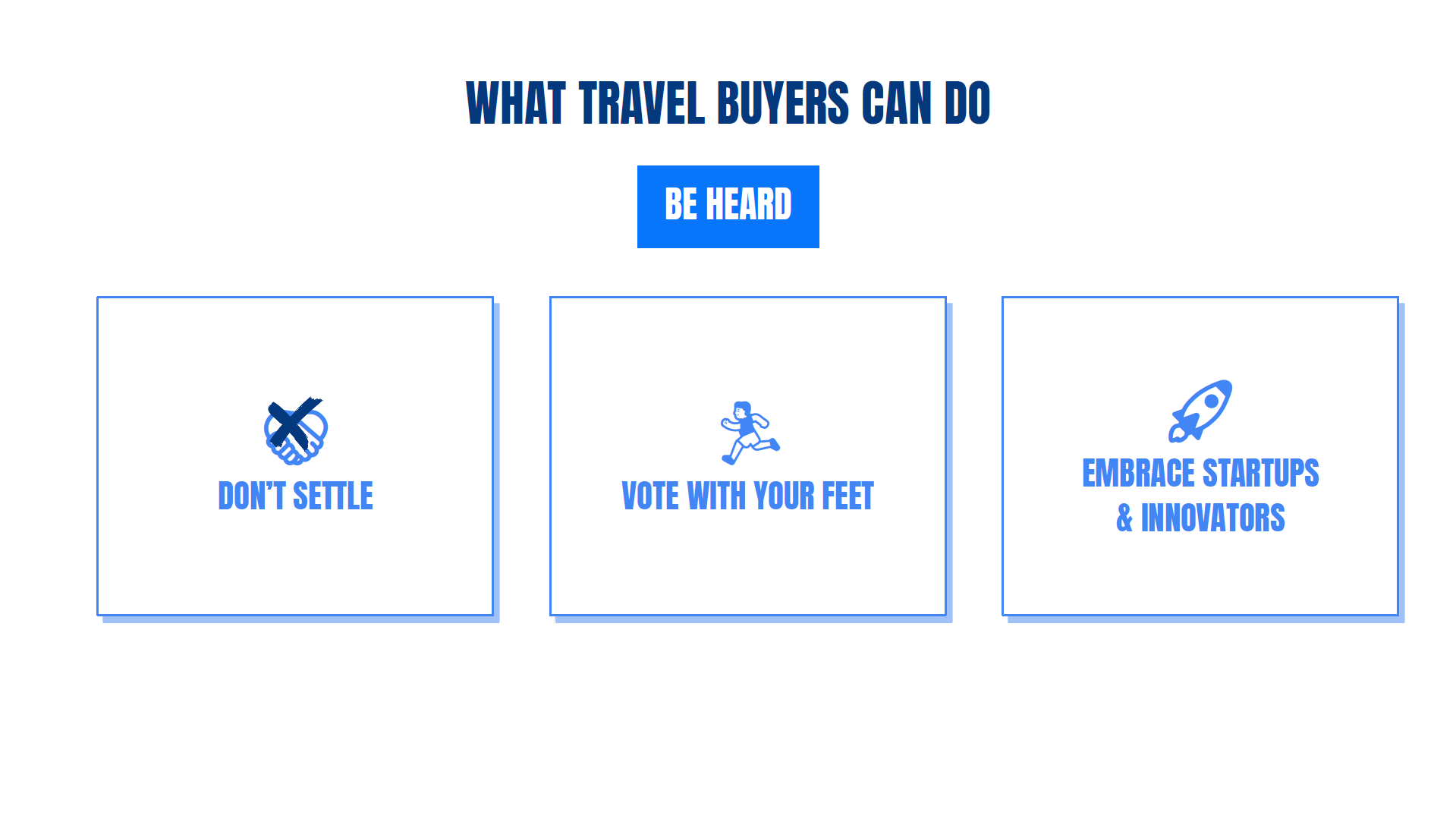
Finally, the airlines. I know we often think of distribution as a holy war. For what it's worth, coming from me, I would urge airlines: if you can get 75% of what you want, take the win.
Trade truly full content for concessions on fees, displays and connectivity.
But airlines have to fix their plumbing too. The software that intermediaries use is not the only really old software in the industry!
And I would urge airlines to rethink their partnerships. This is a little bit self-serving, but it has always baffled me that airlines offer these big competitive advantages to the players who are the least progressive and the least willing to advance airline agendas.
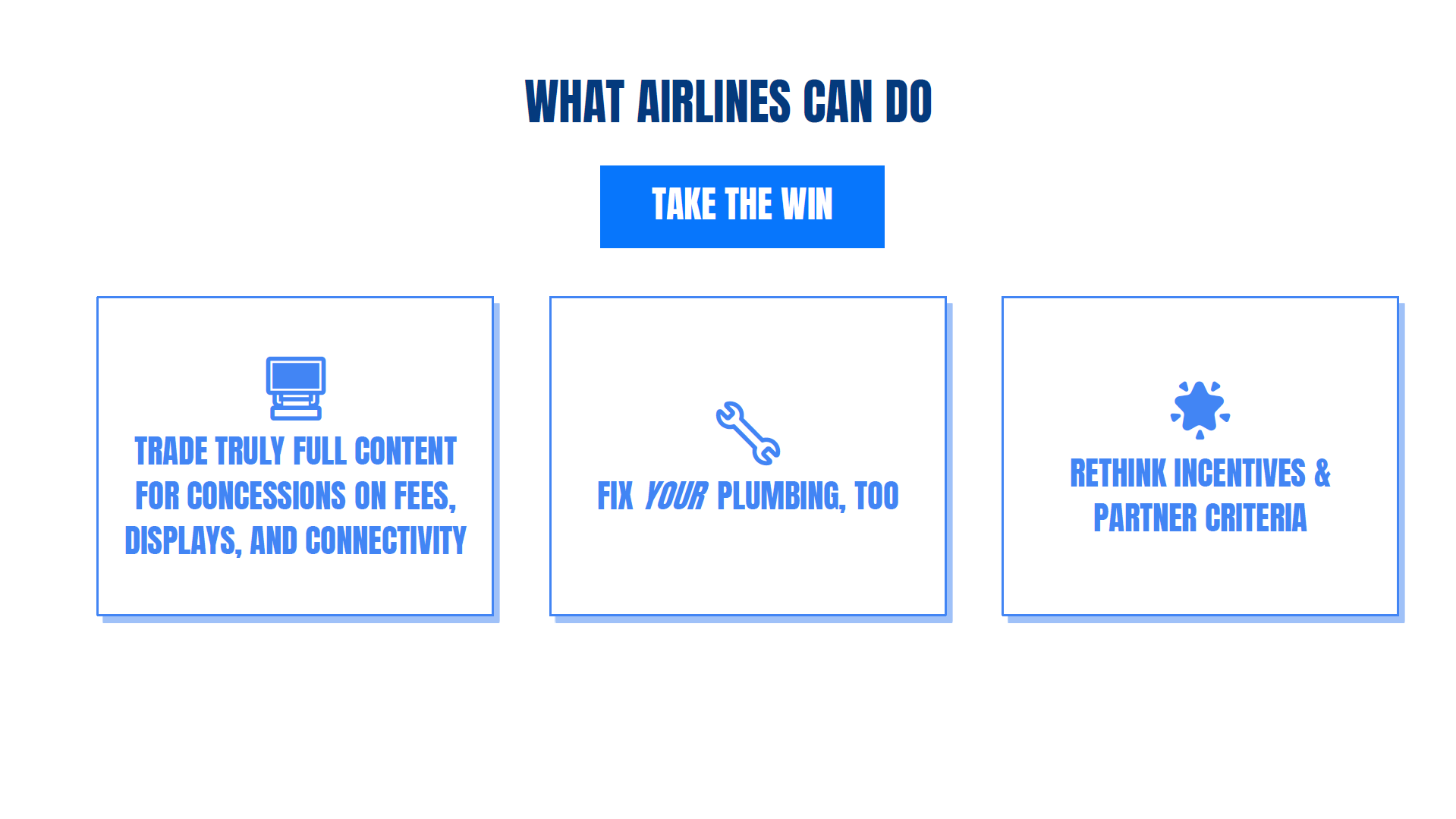
I think we are in reach of a grand bargain where airlines expose their eCommerce platforms with full content and functionality – that means everything: no games where you don't get points if you booked in this channel, or you don't get this fare in that channel. Expose everything.
TMCs agree to consume that content on modern rails and conform to whatever display requirements or selling requirements that airlines have.
And everyone works together to break that wall between indirect and direct distribution – because customers don't think in those terms. Customers don't understand that if they book on an OBT and they're at the airport, they want to be able to change on the airline app, then three days later they might want to change their return flight through their TMC. That should all be doable, and the company should have full visibility into what was spent and where the traveler is, all the time.
Finally, like I said before: we need to flip the model, TMCs need to pay for their distribution aggregators. And when I say aggregators, I'm lumping GDSs and NDC aggregators, I'll even throw Spotnana in there, it's all kind of converging. TMCs need to be willing to pay for their technology.
But, airlines: I don't think distribution should be free. I think TMCs do provide value, and airlines should be willing to pay some sort of commission to TMCs that’s commensurate with the value that's delivered.
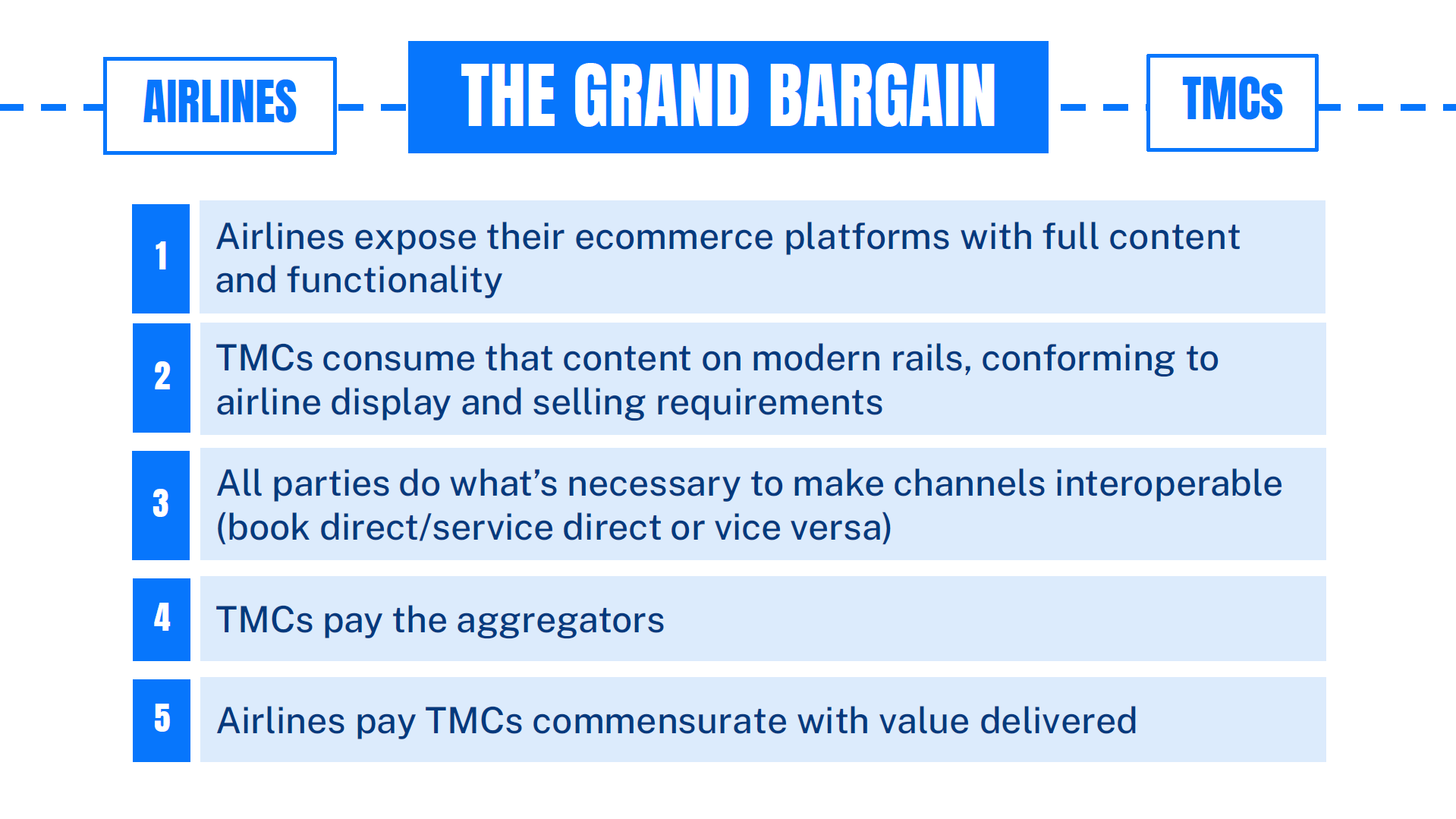
So why should airlines offer TMCs a lifeline, why not just go all direct?
I think there are four reasons.
One, you presumably want to make your customers happy, I think corporations are happier when they can use TMCs, they do value the service.
Two, I think there is a demand gen element to it where business travel is a hassle, and, if we can reduce hassles from the whole trip end-to-end, at the margin more work trips are gonna get booked, and TMCs by letting you book your whole trip at once, by facilitating the payment, by facilitating the expense part – we do make it easier.
Three, do you want to grow another monster? Airlines have a habit of propping up channels that they end up hating. We've seen it with GDSs, we've seen it with Orbitz. Who benefits from disintermediation? Google Flights. People are still going to comparison shop, do you really want Google to be even more powerful than they already are?
And finally, four, I know some airlines are playing around with building duty of care feeds and expense management connections. But that's a rabbit hole, trust me. Airlines: you've got so many bigger fish to fry. Do you really want to go down that road? I would suggest that you leave it to TMCs. We can do a good job with that.
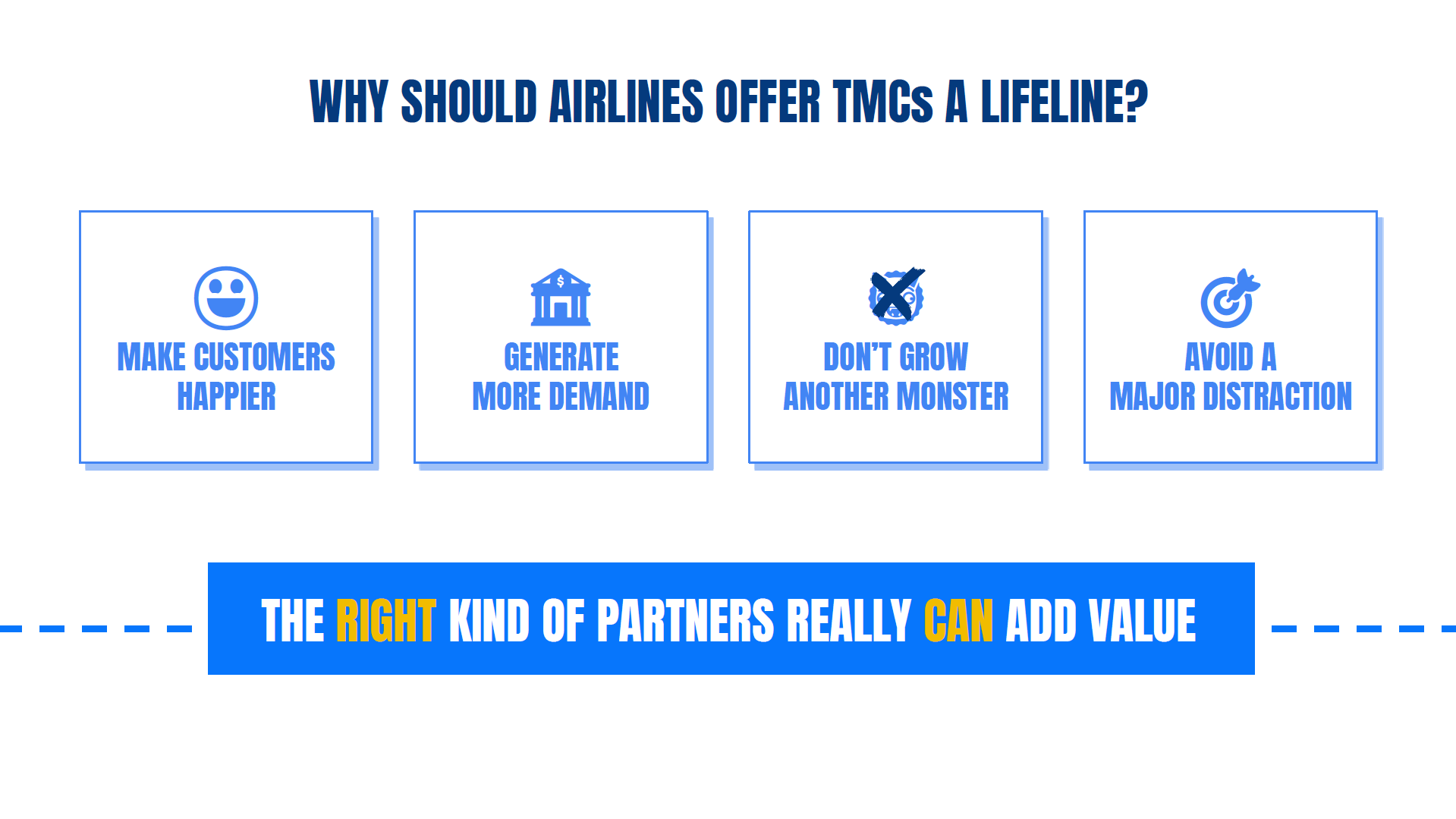
We've reached the end of the beginning.
It's one of the first times in our industry where we're going down a road and it's not quite obvious where it's going.
Things are going to change a lot in the next couple of years, that's for sure.
What gives me hope is that I really believe it's not a zero sum game. I really believe that what's good for airlines is what's good for TMCs is what's good for companies and travelers.
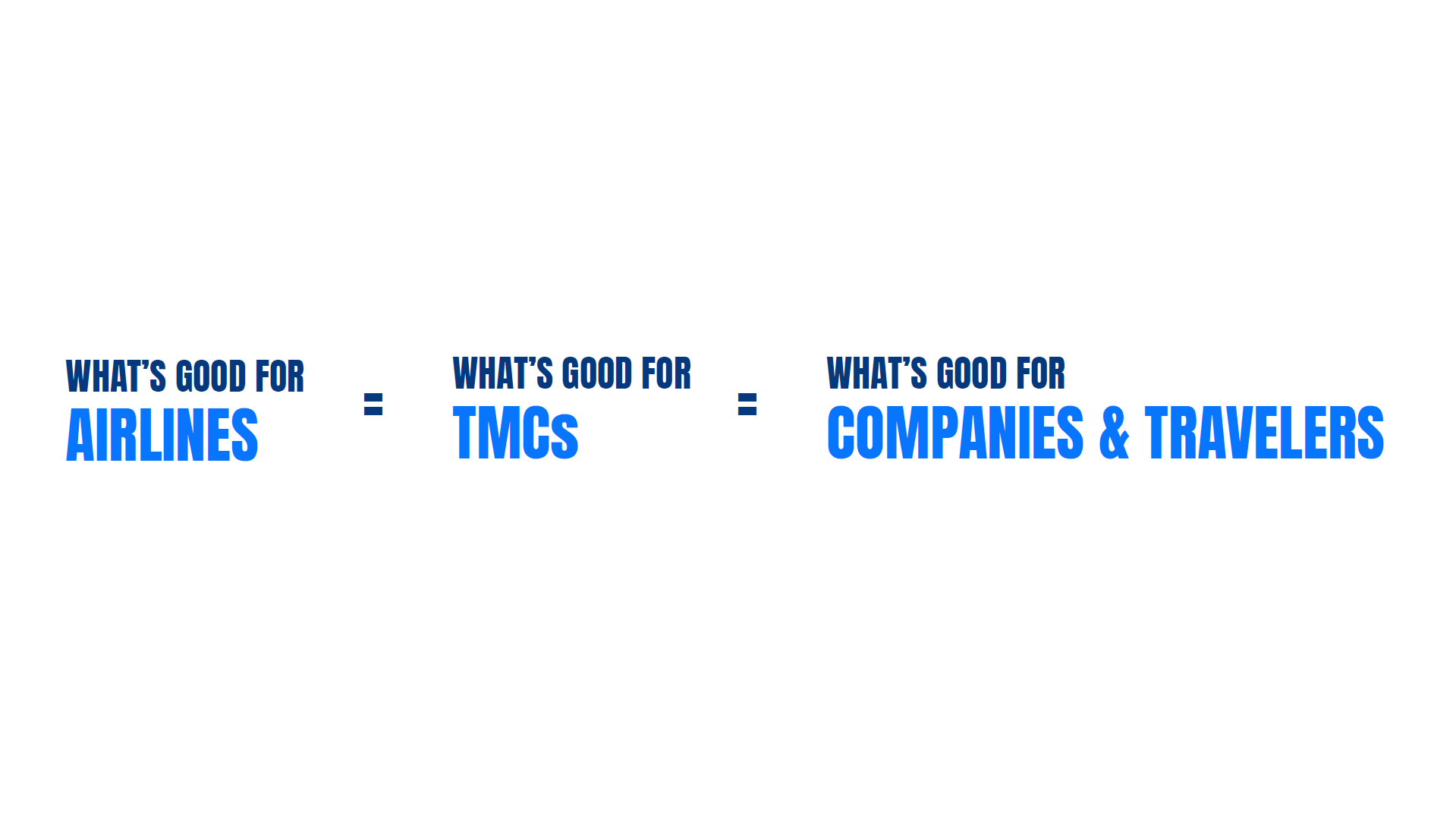
Remember that slide I showed earlier about things AmTrav did to add value to airlines? Every single one of those things was really well received by travelers.
For those of us who want to engage, I think this is a really exciting time to rebuild and rethink all of the antiquated stuff and complexity in our industry.
It's not going to be easy, and it's not going to be without risk.
But if we can succeed I think we can make third-party distribution much more stable and sustainable. But way more important than that, we can genuinely deliver a way better experience for companies and travelers.
But what if we fail?
Who knows, there's no guarantees, Maybe airlines will, at the end of the day, say “we want everything to be direct.”
Maybe the end of the beginning will really be the beginning of the end for intermediaries?
When will we even know?
Probably by the Beat Live 2024. I'm sure Jay will give you a promo code!
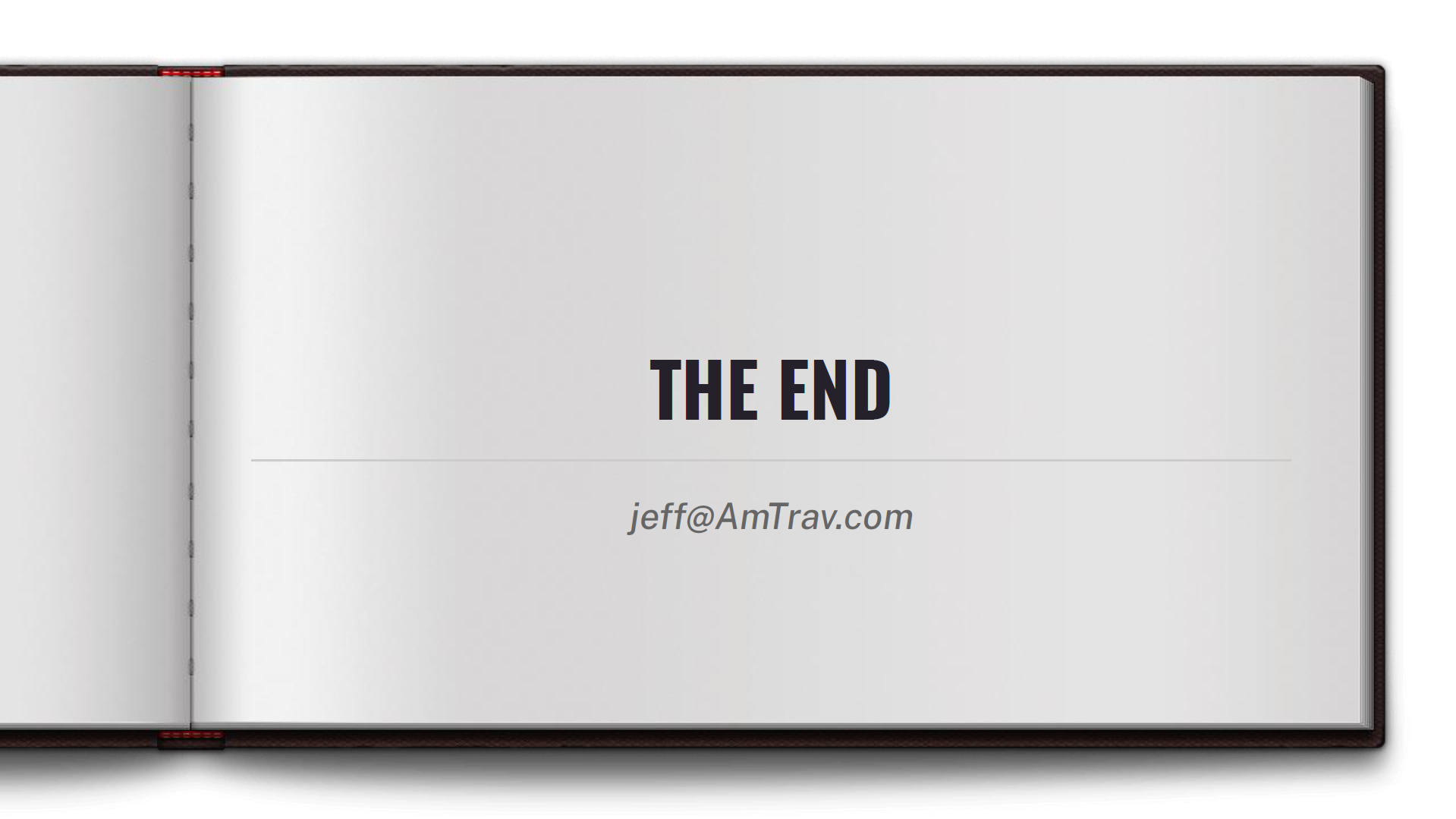

Jeff Klee
